For most of your files, creating a backup is as simple as moving the data from your computer to your backup drive. However, things get a little more complicated when creating email backups, as they don’t keep your data on your device. In this article, we’ll show you how to backup Outlook emails, so they’re safe from unwanted deletion.
There are many options for storing Outlook emails, and with the choices ranging from the CSV to the OST file types, it can get overwhelming. However, if you want to export them for a personal backup, PST and MSG files are a good choice. The first is better for storing whole folders and email accounts, and you can use the second for saving individual emails.
Below you can learn the four different solutions for backing up your Outlook emails alongside step-by-step guides.
Solution #1: How to Backup Emails From Outlook by Exporting
Most versions of Microsoft Outlook come with an option to export everything to a file, and — excluding Outlook 2010 and the web app, which use slightly different systems — there is a standard set of steps you can use. This will get you an Outlook PST file that you can add to your online backup or an external hard drive. Let’s dig into the steps for your Outlook email backup.
- Click “File”
Click the “file” button in the top-left corner of the screen.
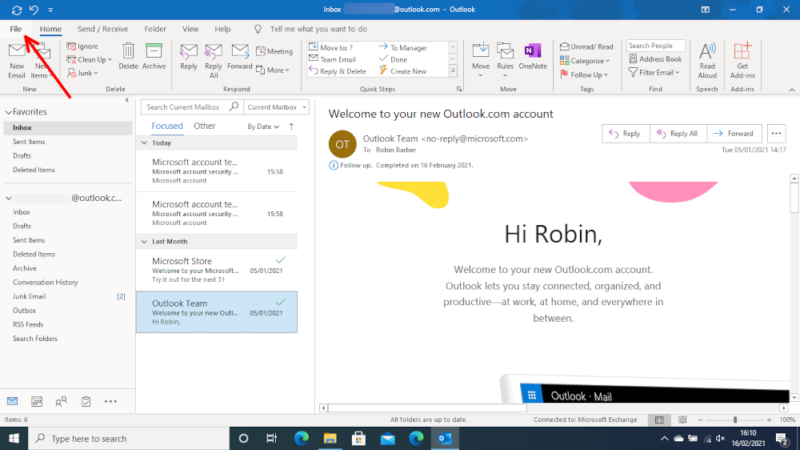
- Go Into the “Open & Export” Tab
Select “open & export” from the list on the left side of the window. You can skip this step if you’re using a version older than Outlook 2013.
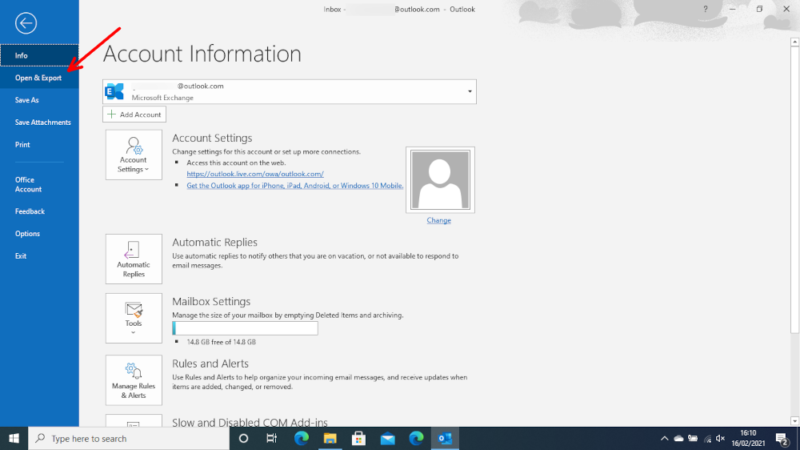
- Select “Import/Export”
Click on the “Import/Export” button to open the import-and-export wizard.
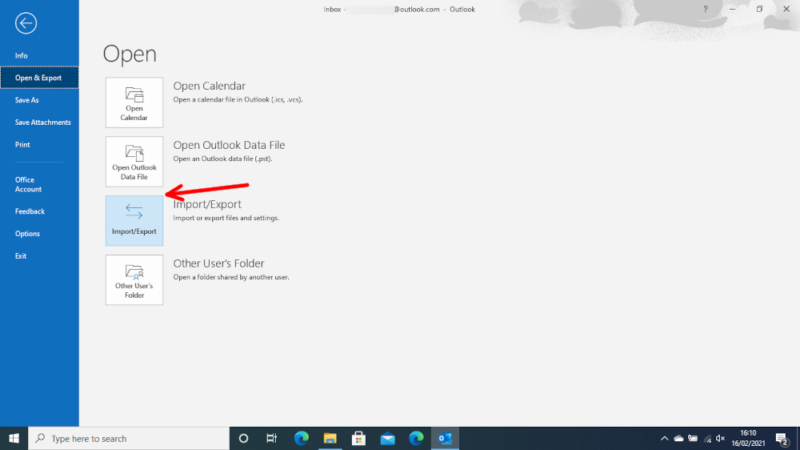
- Choose “Export to a File”
In the import-and-export wizard, select “export to a file” and click “next.”
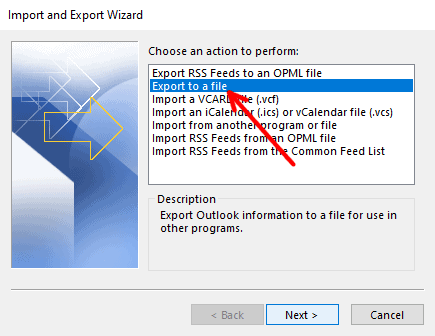
- Go Through the Export Settings
First, choose to create an “Outlook data file (PST)” and select the folder or account you want to backup. Then you can choose where you want to put it and add a password.
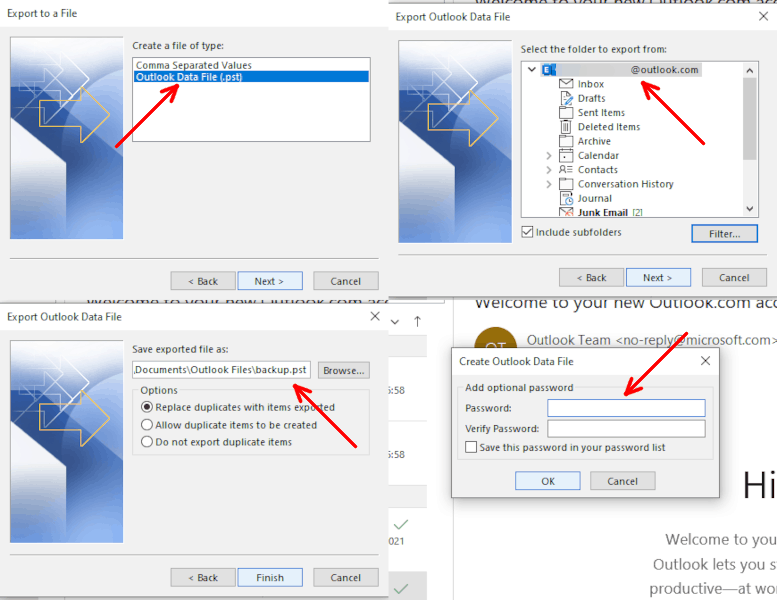
- Find Your Backup
After you click “finish,” go to the folder where you saved your backup and check that it’s there.
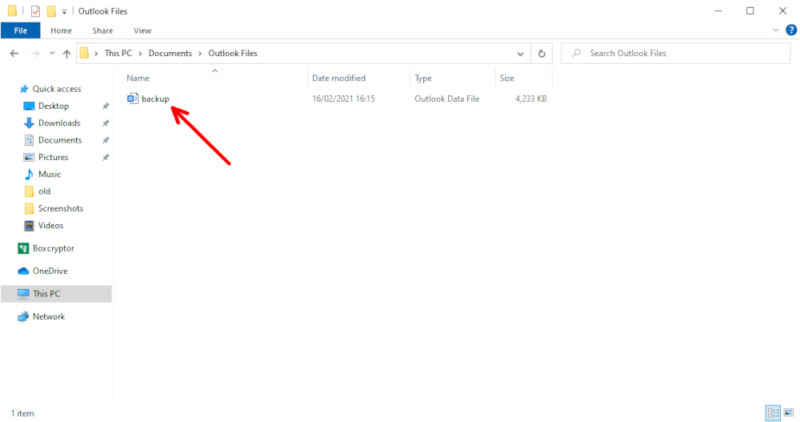
{“@context”:”https:\/\/schema.org”,”@type”:”HowTo”,”name”:”Backup Outlook Emails “,”description”:”This step-by-step guide shows users how to backup Outlook emails. “,”totalTime”:”P00D02M00S”,”supply”:0,”tool”:0,”url”:”https:\/\/www.cloudwards.net\/how-to-backup-your-outlook-emails\/#backup-outlook-emails”,”image”:{“@type”:”ImageObject”,”inLanguage”:”en-US”,”url”:”https:\/\/www.cloudwards.net\/wp-content\/uploads\/2013\/07\/how-to-backup-Outlook-emails.png”},”step”:[{“@type”:”HowToStep”,”name”:”Click \u201cFile\u201d”,”position”:1,”url”:”https:\/\/www.cloudwards.net\/how-to-backup-your-outlook-emails\/#click-file”,”itemListElement”:{“@type”:”HowToDirection”,”text”:”Click the \u201cfile\u201d button in the top-left corner of the screen.\n”},”image”:{“@type”:”ImageObject”,”inLanguage”:”en-US”,”url”:”https:\/\/www.cloudwards.net\/wp-content\/uploads\/2021\/02\/backup-outlook-easy-way-file.png”}},{“@type”:”HowToStep”,”name”:”Go Into the \u201cOpen & Export\u201d Tab”,”position”:2,”url”:”https:\/\/www.cloudwards.net\/how-to-backup-your-outlook-emails\/#go-into-the-open-export-tab”,”itemListElement”:{“@type”:”HowToDirection”,”text”:”Select \u201copen & export\u201d from the list on the left side of the window. You can skip this step if you\u2019re using a version older than Outlook 2013.\n”},”image”:{“@type”:”ImageObject”,”inLanguage”:”en-US”,”url”:”https:\/\/www.cloudwards.net\/wp-content\/uploads\/2021\/02\/backup-outlook-easy-way-export-tab.png”}},{“@type”:”HowToStep”,”name”:”Select \u201cImport\/Export\u201d”,”position”:3,”url”:”https:\/\/www.cloudwards.net\/how-to-backup-your-outlook-emails\/#select-import-export”,”itemListElement”:{“@type”:”HowToDirection”,”text”:”Click on the \u201cImport\/Export\u201d button to open the import-and-export wizard.\n”},”image”:{“@type”:”ImageObject”,”inLanguage”:”en-US”,”url”:”https:\/\/www.cloudwards.net\/wp-content\/uploads\/2021\/02\/backup-outlook-easy-way-import-export.png”}},{“@type”:”HowToStep”,”name”:”Choose \u201cExport to a File\u201d”,”position”:4,”url”:”https:\/\/www.cloudwards.net\/how-to-backup-your-outlook-emails\/#choose-export-to-a-file”,”itemListElement”:{“@type”:”HowToDirection”,”text”:”In the import-and-export wizard, select \u201cexport to a file\u201d and click \u201cnext.\u201d\n”},”image”:{“@type”:”ImageObject”,”inLanguage”:”en-US”,”url”:”https:\/\/www.cloudwards.net\/wp-content\/uploads\/2021\/02\/backup-outlook-easy-way-export-file.png”}},{“@type”:”HowToStep”,”name”:”Go Through the Export Settings “,”position”:5,”url”:”https:\/\/www.cloudwards.net\/how-to-backup-your-outlook-emails\/#go-through-the-export-settings”,”itemListElement”:{“@type”:”HowToDirection”,”text”:”First, choose to create an \u201cOutlook data file (PST)\u201d and select the folder or account you want to backup. Then you can choose where you want to put it and add a password.\n”},”image”:{“@type”:”ImageObject”,”inLanguage”:”en-US”,”url”:”https:\/\/www.cloudwards.net\/wp-content\/uploads\/2021\/02\/backup-outlook-easy-way-export-settings.png”}},{“@type”:”HowToStep”,”name”:”Find Your Backup”,”position”:6,”url”:”https:\/\/www.cloudwards.net\/how-to-backup-your-outlook-emails\/#find-your-backup”,”itemListElement”:{“@type”:”HowToDirection”,”text”:”After you click \u201cfinish,\u201d go to the folder where you saved your backup and check that it\u2019s there.\n”},”image”:{“@type”:”ImageObject”,”inLanguage”:”en-US”,”url”:”https:\/\/www.cloudwards.net\/wp-content\/uploads\/2021\/02\/backup-outlook-easy-way-saved-file.png”}}]}
Where Is My Microsoft Outlook Data File?
When you export your Outlook emails, it puts the data file in the “Outlook files” folder in your documents. You can change this, but it’s also the location where Outlook will look for backup files. It’s worth keeping a copy here to make it easier to import the file.
How to Restore a Outlook Emails from Backup
To restore your email from a backup, you should go into the “open & export” tab and select either “open Outlook data file” or “import/export.” The first will let you access your emails and move them back into your inbox, while the second will let you import the PST file into a new account.
Alternative Ways to Backup Outlook Emails
Although it’s easy to create a PST file with the tools Microsoft provides, it can only be used to backup a full folder, and you can’t access the emails individually. So, if you’re wondering how to save Outlook emails, there are luckily three other solutions that let you save individual emails, which you can then access at any time.
Solution #2: The Drag-and-Drop Method
One quick way to backup a few emails in Outlook is to use the “drag and drop” method.
- Open Up Outlook and Windows File Explorer
You’ll need to have both Outlook and Windows File Explorer open for this method.
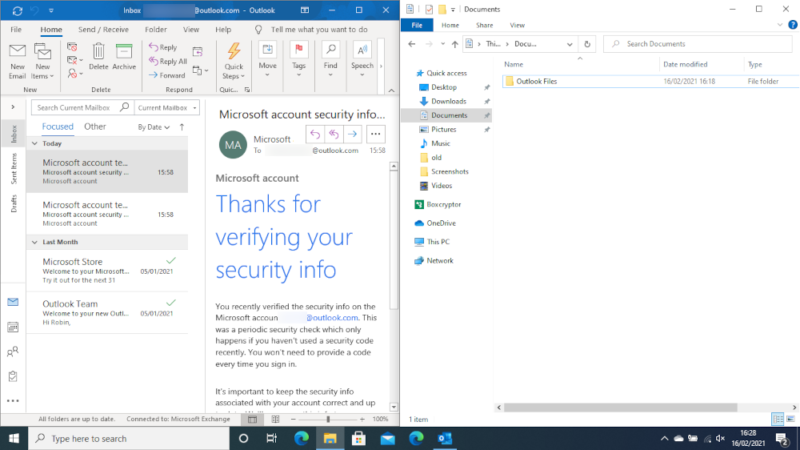
- Select Your Emails
Select the email you want to backup. If you want to select multiple emails, hold down the “control” key.
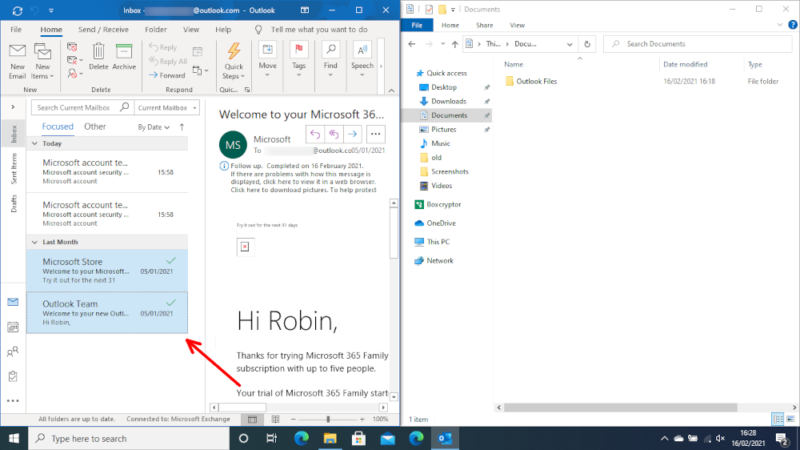
- Drag the Emails Into Windows File Explorer
Drag and drop the selected emails into the folder where you want to keep them.
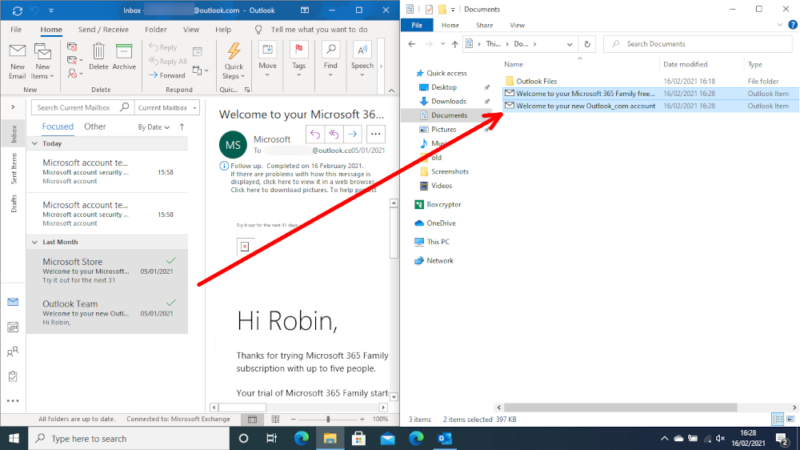
Solution #3: The “Save As” Command
You can also backup an email with the “save as” command.
- Select the Email and Click “File”
Select the email you want to save and click “file” in the top-left corner.
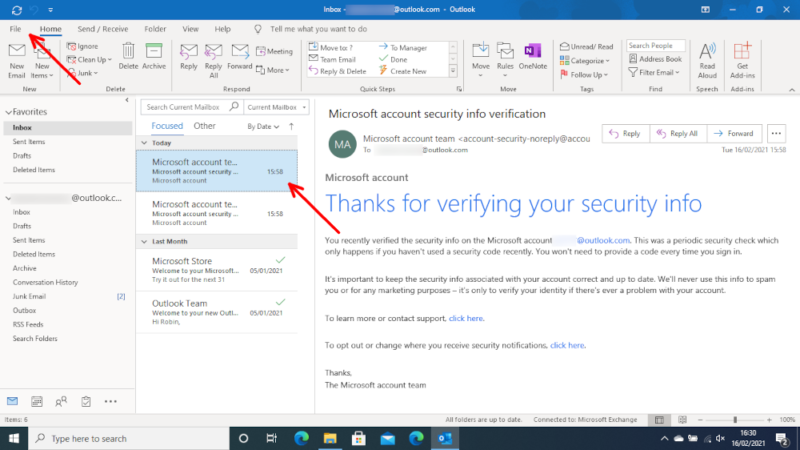
- Open the “Save As” Window
Click “save as” in the list on the left to open the “save as” window.
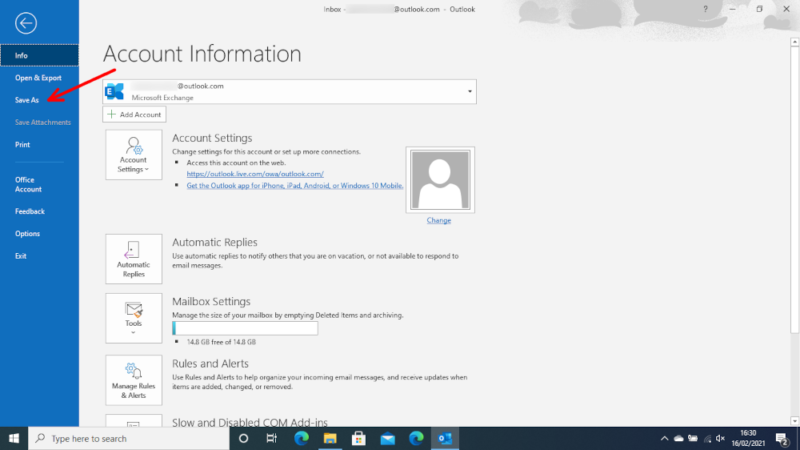
- Click “Save”
Navigate to where you want to put the backup and click “save.”
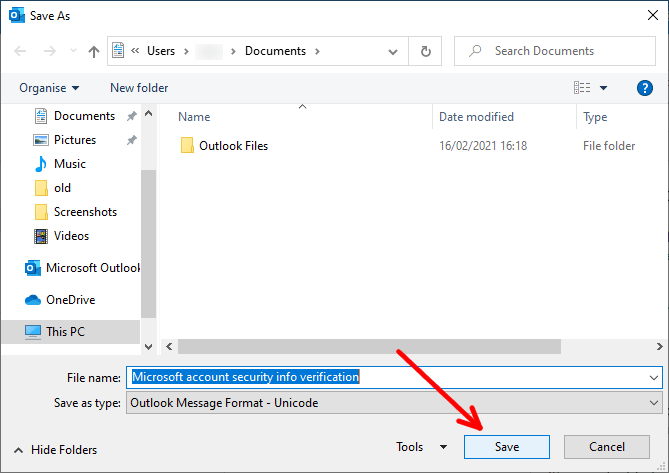
- Find the File in Windows File Explorer
Check that the file is where you expect it to be.
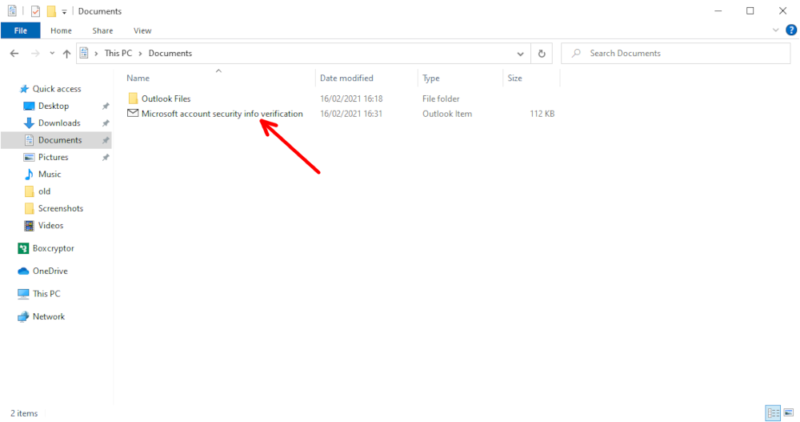
Solution #4: Backup Your Outlook Emails to Excel
Outlook is also pretty handy for exporting email data to other Microsoft tools like Excel. This solution is ideal for users who want to dive into their email data, analyze their communication, or keep a neat record of their conversations.
- Open Outlook and Click File
Click the “file” button in the top-left corner of the screen.

- Go Into the Options Tab
Select “Options” from the list on the left side of the window.
- Click “Advanced”
Navigate to the “Advanced” tab as shown in the photo.
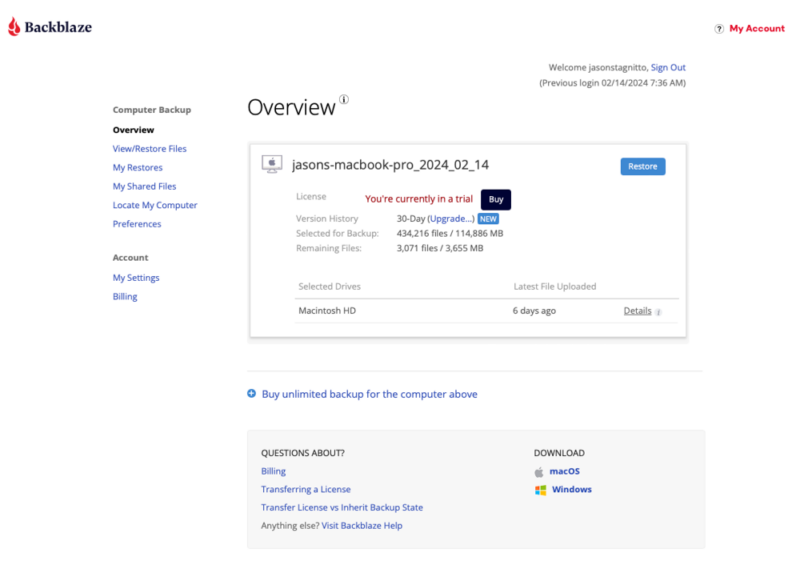
- Click “Export”
Navigate to the “Export” button.
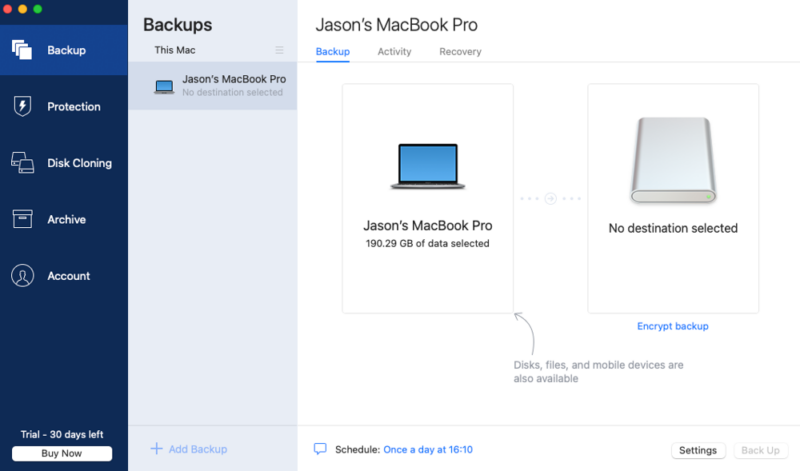
- Select “Export to a file”
From the pop-out menu, select “Export to a file” and click “Next“.

- Choose “Microsoft Excel” or “Comma Separated Values”
Depending on your Outlook settings, you will either get the option to export your emails to Microsoft Excel directly, or into a CSV (comma separated values) file. This type of file can also be opened using Excel. Pick either of these options and click “Next“.
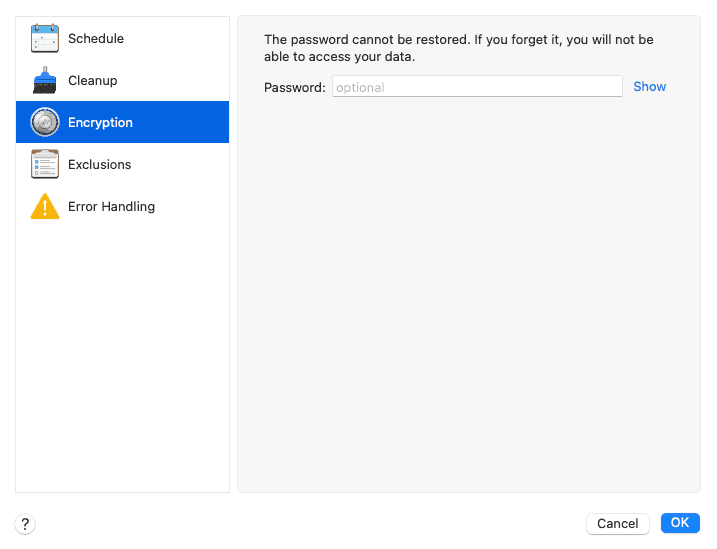
- Select the Email Folder You Wish to Export
Choose the email folder from Outlook that you want to backup and click “Next“.
- Choose a Location to Save Your Emails
Pick a location on your computer where you want your emails to be exported in the form of an Excel file. Click “Finish” — and you’re all done.
Final Thoughts
Being able to create a backup is a great tool for protecting your data, and Microsoft Outlook lets you do it easily. The export process isn’t difficult and will work on almost any version of Outlook. If none of the methods listed in this article work for you, you can head over to Microsoft’s official page on backing up your Outlook emails and try to find a solution there.
However, it isn’t the only email service that lets you create backups. Other email providers, like Google’s Gmail, also let you export your data, so you can add everything to your backup.
Once you have your backup file, you should consider where you’re going to store it. One solution is to use a good external hard drive with lots of cheap storage, but PST files are quite small. A more reliable solution is to use a cloud storage provider, email backup service or online backup service to keep your data safe from hard drive failure and other physical threats.
Have you backed up your Outlook emails? Did you use one of these methods? Let us know your thoughts in the comments section below. Thanks for reading.
FAQ
-
The only way to automatically save Outlook emails to your computer without third-party software is with the “autoarchive” settings. You can access this by going into “file,” clicking on the “options” tab and then going into the “advanced” section. However, it’ll only save old emails, and there’ll be a new PST file every time it archives your emails.
-
You can save Outlook emails to your hard drive with the built-in “export to a file” function. However, this will create a PST file that you will need to import into Microsoft Outlook if you want to access the emails. If you want to view your mail on your computer without importing it, you should instead use either the “save as” or drag-and-drop methods.
-
Yes, by exporting your Outlook emails to a PST file, you can download everything at once. This will even include subfolders, although it may lose some meta-data, like the folder properties. You can then move this Outlook backup file to another computer or save it to the cloud until you need to recover your emails.
-
If you’re using a single physical drive to store the backup, then it will eventually fail. However, with a redundant storage system — such as NAS or online storage — the backup file will work unless Outlook stops supporting PST files.
{“@context”:”https:\/\/schema.org”,”@type”:”FAQPage”,”mainEntity”:[{“@type”:”Question”,”name”:”How Can I Save Outlook Emails to Computer Automatically?”,”acceptedAnswer”:{“@type”:”Answer”,”text”:”
The only way to automatically save Outlook emails to your computer without third-party software is with the \u201cautoarchive\u201d settings. You can access this by going into \u201cfile,\u201d clicking on the \u201coptions\u201d tab and then going into the \u201cadvanced\u201d section. However, it\u2019ll only save old emails, and there\u2019ll be a new PST file every time it archives your emails.\n”}},{“@type”:”Question”,”name”:”How to Save My Outlook Emails to My Hard Drive?”,”acceptedAnswer”:{“@type”:”Answer”,”text”:”
You can save Outlook emails to your hard drive with the built-in \u201cexport to a file\u201d function. However, this will create a PST file that you will need to import into Microsoft Outlook if you want to access the emails. If you want to view your mail on your computer without importing it, you should instead use either the \u201csave as\u201d or drag-and-drop methods.\n”}},{“@type”:”Question”,”name”:”Can I Download All My Outlook Emails?”,”acceptedAnswer”:{“@type”:”Answer”,”text”:”
Yes, by exporting your Outlook emails to a PST file, you can download everything at once. This will even include subfolders, although it may lose some meta-data, like the folder properties. You can then move this Outlook backup file to another computer or save it to the cloud until you need to recover your emails.\n”}},{“@type”:”Question”,”name”:”Will My Outlook Email Backup Last Forever?”,”acceptedAnswer”:{“@type”:”Answer”,”text”:”
If you\u2019re using a single physical drive to store the backup, then it will eventually fail. However, with a redundant storage system — such as NAS or online storage — the backup file will work unless Outlook stops supporting PST files.\n”}}]}
The post How to Backup Outlook Emails in 2024: Protect Your Mail appeared first on Cloudwards.

